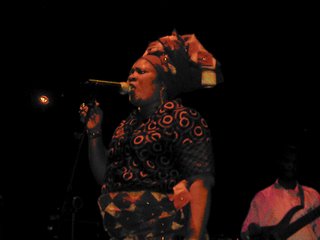Monday, May 29, 2006
rachel oniga
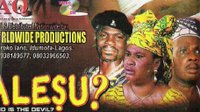 How refreshing to have a sighting of a Nigerian star on the streets of London, for a change. It doesn't happen to me often. I saw Sola Fosudo on a train platform at Wembley Park Station once. I looked at him and he looked at me in the way famous people do when it dawns on them they've been recognised while trying to be incognito. We looked at each other again, then we both thought better of it and moved on without a word.
How refreshing to have a sighting of a Nigerian star on the streets of London, for a change. It doesn't happen to me often. I saw Sola Fosudo on a train platform at Wembley Park Station once. I looked at him and he looked at me in the way famous people do when it dawns on them they've been recognised while trying to be incognito. We looked at each other again, then we both thought better of it and moved on without a word.But I've been watching more than my fair share of Nollywood video films of late, and so when I saw Rachel Oniga at Victoria Bus Station about 6pm last Thursday, I couldn't just walk on. She kept looking at her watch and it was clear she was waiting someone. Then there was me going up to her to say I love her performances in the Nollywood films I've seen featuring her. She smiled graciously through the whole thing. I'd moved on before realising I had not allowed her to get a word in!
Here she is on the packaging of one of the ones I've watched in the last week, Talesu?
salawa abeni in concert
 From The London Eye into the Queen Elizabeth Hall, and it was an evening of dancing, dancing and dancing last night with Queen Salawa Abeni.
From The London Eye into the Queen Elizabeth Hall, and it was an evening of dancing, dancing and dancing last night with Queen Salawa Abeni.

I'd never seen Abeni in a concert setting before, and she was quite something. She was the closing act in the week-long 4th London African Music Festival, which began on May 19.
ayetoro, shhh...
- The above is excerpted from a post by Renegade Eye on the new blog, Shhh... in memory of the recently departed Katherine Dunham. Shhh... is an interesting blog with plenty of musical content - from Fela & Femi Kuti and others, with audio features for listening to music samples.
ala conference
- Ghana's Kofi Awoonor speaking at the 32nd meeting of the African Literature Association (ALA) - held earlier this month in Accra. Read a report on the conference here.
the overwhelming - a play
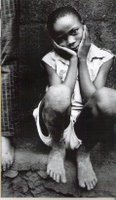 The Overwhelming is a play set during the Rwandan Genocide. It had its world premiere at the National Theatre, London, on May 9.
The Overwhelming is a play set during the Rwandan Genocide. It had its world premiere at the National Theatre, London, on May 9.I saw a performance on Friday evening and thought it was staggering. Well, I staggered out at the end. The cast includes Danny Sapani, Jude Akuwudike & Adura Onashile. Those who can see the play, should do so.
The play's at the National's Cottesloe until August.
* Production photo
Tuesday, May 23, 2006
poetry review
 Poetry That Tests the Patience
Poetry That Tests the PatienceBy Molara Wood
Open Sesame by Emman Usman Shehu, Bookcraft (Ibadan), 2005, pp80.
This review resists the temptation to tackle the collection titled Open Sesame from the beginning, and does the opposite - starting almost at the end. The poem, ‘Chant of a Flaming Tongue’ does not make an appearance until page 68 of this, the second volume of poetry by Emman Usman Shehu.
The poet's first collection, Questions For Big Brother, was published along with the debuts of four other ‘Update Poets’ by the Association of Nigerian Authors (ANA), in 1988. Open Sesame, Shehu’s follow-up, has taken nearly two decades to arrive.
The volume brings together 61 poems over some 80 pages, with an introduction by critic Harry Garuba. With 17 stanzas spanning five pages, ‘Chant of a Flaming Tongue’ is the longest work in Open Sesame; it is also one of the more successful pieces in the collection.
Taking his cue from Cuban poet Herberto Padilla’s exhortation for the "dangerous poem," Shehu responds:
the moment I open my loud mouth;
this orifice, this buccal cavity, this repository
of a restless, blaring, flaming tongue…
In the voice of a righteously indignant braggart, the piece ranges over many of the poet's concerns. From the late Herberto and Cuba's reactionary politics, Shehu connects with Nigeria - in lines desirous of a revolution.
when the people are tired of wailing?
And who knows what will happen
when the people are tired of suffering?
And who knows what will happen
when the people are tired of praying?
Often sounding - like much of Shehu’s socially conscious poetry - like a political speech delivered on a hastily improvised soapbox, this is poetic pamphleteering of sorts. The poem also delves into the deeply personal. Therefore, the dead being celebrated as inspiration and catalyst for change is not just Herberto, but also the poet-persona’s parents.
The celebration of women in their many guises is a running theme in Open Sesame and informs the depiction of the mother in ‘Chant of a Flaming Tongue.’ Mama warned the poetic voice of possible ruin via his mouth, but he insists:
Yet she gave me this loud mouth.
Yet she gave me this flaming tongue.
Yet she nurtured this unyielding conscience.
A resistance of certain strictures of Nigeria’s feudal North emerges strongly. There is a real identification with the mother figure, and an engagement with the travails of women. The poetic voice leaves no doubt that he is able to mount such resistance only because his mother raised him that way. She herself was no stranger to "improvised speaker’s corners"; she fought "turbans of hypocrisy" and "scrubbed henna / of retrogression from the minds of her sisters." By the time we come across the line: "My loud mouth Mama warned me…" the cycle is complete. Mama herself is recast as a ‘loud mouth.’
Papa gets a mention too, but mainly in a supporting role to the mother, in a subversion of gender roles. It is not the woman that ‘stands by her man’ in Shehu’s poem; it is the man, and he pays the price of ostracism from society.
The poem is one long ‘wail’ to Mama, Papa and Herberto. It connects the personal with the public in its anticipation of societal change. Anything could happen, the poem says - hence its dangerous quality.
The play with gender continues in ‘Gorgon’, in which a dictator not unlike General Sani Abacha is feminised into the Medusa of Greek mythology - subverting the exaggerated machismo of his ilk. The first stanza, riddled as it is with clichés about chills running down spines and "surprised eye-balls" - is a tad unfortunate. However, the use of clichés is part of the poet's established style; his leaning towards dub poetry evidenced by the fact that he is also a musician.
Added to the unapologetic use of clichés, rhymes and repetitions that reinforce the musicality of the lines, the collection is full of references to myths. Figures from the Arabian Nights, the Bible and nursery rhymes, even popular culture regularly pop up. Thanks to Shehu’s penchant for clever wordplay, the Pied Piper becomes a ‘paid’ one in ‘Piper’. The poem uses the nursery rhyme mode to denounce political hired mouths and praise-singers in tunefully repetitive, alliterative sarcasm.
The praise singing formula is itself turned on its head in ‘A Daily Cry.’ The chant-like work is an indignant cry: of the poor to the rich, the weak to the strong, even the disabled to the able-bodied. Ultimately, the poet rails against the tendency of the more fortunate in society - to look the other way.
Then Shehu whips up a storm in the discordant soundscape of ‘The Caged Birds Screech.’ A declaratory piece, it is a call to rejuvenation, rendering the pain, the discomfiting noise, and clamour of the dispossessed. With the refrain: "Open Sesame!" - from which the volume gets its title - Shehu fuses the Arabian Nights with television. The poet envisages a magically transformed reality free from the "caves of despotism" and "the Forty Thieves" of society. In the clangour, Big Bird gains the symbolic gift of flight.
‘Sirenade’ is another inspired title, conflating in one stroke the siren of visiting dignitaries’ motorcades with the welcoming serenade. Only, this ‘sirenade’ is a song of suffering.
Sir, you are passing by,
or this time stopping-by
to see the ghetto-hood?
Wail-wail,
wail-wail,
wail-wail.
Sir, we have no buntings
or hip-wriggling maidens
to line the rut-tarred route.
It is tempting to imagine that Shehu might one day become the master of the formulaic verse. Whether he succeeds at this, will depend on how successfully he resolves the poetic tension between the spoken and the written qualities in his work. In Open Sesame, there is a certain disjointedness of space between the two - and the poems themselves bear out the contention.
Many of the pieces would work better in performance than on the page. They insist on the duality, necessitating a self-consciousness in the reader. Thematically and stylistically, this is poetry that tests the patience of the reader, conditioning a certain approach to the act of reading itself. A rewarding reading of poems like ‘Beware’, ‘Diversions’ and ‘Hook, Line and Sinker’ - would involve their being read aloud, as though to music.
The first stanza of the short ‘Hooks’, declares:
My words seize
the pages
of your mind
in a reading instant.
The boastful voice is akin to Rap music, and not unlike rapper Nas bragging:
But formulas can only go so far, and Shehu’s poetry could do without some of its self-imposed strictures. There is an unhelpful attachment to prepositional phrasings. Instead of trusting his lines to convey mood, Shehu often spells it out. Thus, Open Sesame is replete with phrases like: "wheels of affluence." "votes of optimism." and "clarion of opulence." In ‘After the Siege,’ one could almost play a game of ‘spot the three-word phrase. There were at least eleven examples; and they clobber the work with predictability.
Clichés too, are a mixed bag, and not even a poet of Shehu’s experience can transform examples like "no holds barred" and "raging bull" when they surface in the collection.
But when it comes to taut explorations of the gender divide, the poet has an assured touch - with the short, sharp pieces that open the volume. Race and class divides are transgressed in the first poem, ‘Goldilocks’.
Goldilocks straight from uptown
took her chance downtown
and broke the standing rule
in the strange arms of Dreadlocks.
Much meaning is compacted in the encounter between the blonde Goldilocks and the Rastafarian Dreadlocks. The narrative seems to continue with the next piece, ‘Lease of Life’. Goldilocks may not have led such a fairytale life after all; she meets him:
at another junction
of her turbulent life
The "red light" turned to "amber" and then to green, suggesting possible progression from a life of vice to a clean, respectable one. The poet moves with ease from the grand themes of his longer pieces and, with some distancing, gives equal attention to minute details. A keen observer, he ponders upon ageing in ‘Telltale’:
The crow and his feet
turn the outer sides
of her bewitching eyes
into a standby helipad
of a soft landing
the talcum fails to hide.
Due to Emman Usman Shehu’s stylistic daring, his poetry is stripped of the pretentiousness that characterises the work of some of his contemporaries. It should be interesting to see how the poetic tension of Open Sesame is resolved in his next volume.
* Published in The Guardian, Lagos, on Sunday May 14, 2006.
writers lobby the chinese president
Your Excellency President Hu Jintao,
In the wake of your two-day visit to Nigeria, we the undersigned Nigerian writers could not but draw your attention to and deplore some of the practices of the Chinese government. China is emerging as another economic and political superpower whose foreign policy will bear a vast influence in world affairs. It very unlikely that a government that is repressive at home would have a foreign policy that differs from what it espouses and offers at home.
Truly your country is a fine example of rapid economic growth and prosperity to the developing nations, it must be so too in matters of basic human and environmental rights. First, we urge China to submit itself to global covenants on the environment. By declining to be a signatory to the Kyoto Protocol it shows that the Chinese government is not environmentally responsible and we doubt if its oil foray in Nigeria would not further ensure the eco-degradation of the Niger Delta.
We urge China to be open and responsive to human rights and fundamental freedoms part of which include freedom of _expression, religious and political liberties. We ask you to free many of our persecuted colleagues and other dissenters whose offence is expressing opinions that are different from the communist consensus. Some of these are Shi Tao, Cai Guihua, Han Lifa, Lin Hai, Zhang Shanguang and others recently imprisoned. Also we recall Zhou Jianhe, Wei Jingsheng, Wang Bingzhang, Bao Ge and many others who remain in forced exile.
We deplore western interests such as Microsoft, Yahoo, and Google which in doing business with China for acquiescing to its repressive modus operandi thereby becoming accomplices. The west must realize that the defeat of Soviet totalitarianism was possible because they stood firm, persistent and unambiguous on their position even in matters of trade and investments. Finally, we deplore China's strategic oil interest in Sudan which has not been favourable to the resolution of the protracted crisis in Darfur. China should be able to condemn the mass killings of a black minority in Darfur and boycott the Sudanese government that connived to perpetuate it. As you said in your recent stop over in Kenya that you operate "a policy of non-interference in the affairs of other countries." This is outdated, unacceptable and dangerous. What is necessary is a policy of responsible interference.
· Deji Toye, Chris Ihidero, Damola Awoyokun, Rotimi Babatunde, Akin Adesokan are Nigerian writers resident in different parts of the world.
weekend events
african filmfest in ghana - until may 27
A PAN-AFRICAN FESTIVAL OF DOCUMENTARY FILMS
IN ACCRA
Objective
"Real Life" (a Twi translation is pending) inaugurates an annual film festival dedicated to documentary films based on the histories, peoples, heroes, cities and locations of African and diasporic African communities. The event will bring together filmmakers, scholars, students and film enthusiasts to one of the greatest historic Pan-African cities in the world—Accra, Ghana. It will be the continent’s major initiative and forum for the production, cataloging and exhibition of documentary film records of African and African-diasporic subjects in global history.
In addition to exhibiting documentaries by filmmakers from Africa and beyond, the festival will include a program of student films comprising entries from Ghana’s National Film and Television Institute as well as those from other students world-wide that portray Pan-African images.
This festival will invite filmmakers from all over the world, as well as exhibitors engaged in the industries of producing and distributing films. Workshops by filmmakers and exhibitions by companies in the film business will complement the screenings. The program will also include an exhibition of photographic interpretations of Pan-African subjects by leading photographers.
The events are open to the general public and seek to inspire young filmmakers and documentarians to address the arts, politics, and social issues of relevance to the Pan-African world. It hopes to promote awareness of and engagement with these concerns among African audiences at all levels – from schoolchildren through adults in all walks of life.
The festival is part of the newly inaugurated West African Documentary Forum – a production, post-production, archiving and scholarly organization dedicated to producing and documenting knowledge on contemporary African and African diasporic issues through films.
Why Ghana, Why Accra?
As the name of this annual upcoming annual gathering suggests, the initiators of the project would like to circumscribe their action within a regional West African framework, and more specifically that of the member-states of ECOWAS (Economic Community of West African States). The ultimate ambition though is to extend the reach of the forum to all member-states of the African Union.
Ghana, an Anglophone country, is strategically located on the West African coast and shares all its borders with French-speaking countries. This privileged position makes the country a central player able to foster intellectual and cultural dialogue and exchange. Indeed Ghana has a long intellectual tradition in the region and is historically known as the beacon of Pan-Africanism. One of its neighbors, Burkina Faso, has been hosting the Pan African Film and Television Festival of Ouagadougou (FESPACO) for almost forty years. Although FESPACO is the most important filmic event on the African continent, its all-encompassing dimension prevents it from focusing on specific aspects of the continent’s filmic production. The proposed documentary film forum to be held in Accra will fill in this major gap through its emphasis on the documentary film form.
Accra is the capital city of a politically stable country with strong economic potential. It hosts numerous international public institutions as well as a vibrant NGO community that contributes to its development. The proliferation of debates in the written press and on radio is evidence that the plurality and free expression of opinions are guaranteed.
The televisual map of the city is shared by the Ghana Broadcasting Corporation, a national, public television channel and TV Africa, a private channel owned by Kwaw Ansah, one of the main african filmmakers. The presence of South African communication companies offering bouquets of channels and programs from around the world to their subscribers is also of note.
The choice of Ghana is also justified by the fact the country has a long-standing documentary tradition in Africa. Indeed, even prior to independence, the colonial administration used documentary as part of its propaganda machinery in its civic, health and school "education." Since independence, documentary production has grown steadily and continues to be used in its nation building initiatives.
Ghana was also the first country South of the Sahara to create a film and television school-the National Film and Television Institute (NAFTI). The school is an intrinsic element of the West African Documentary Film Forum Indeed, the initiators of the project consider the school a key organizational component of the Forum as well as one of the best locations for screenings and meetings with its 300 seat capacity.
Why Documentary?
It is common knowledge that the majority of the population in Africa cannot read and write. Illiteracy is still rampant despite tremendous efforts on the part of governments. In such a context, documentary film is an effective means of democratizing access to knowledge. Through documentary, ancient and contemporary history could be taught to the populations in Africa, in their own languages and by their own compatriots. Documentary could help explain complex news programs and items to audiences who might not understand them at first by virtue of their inability to read and write. It enables access to "literacy through visual media". It could also serve as a medium for visual literacy in our media saturated world. Finally, it could be a means of self-expression, self-actualization and self-realization. Documentary could also be a vehicle of discovery and exploration, of learning through fun and entertainment. As such it could be attractive to the youth, which will be a central focus of the Forum.
Through these various actions of the Forum, the practice of informed citizenship by populations may be reinforced and may contribute to the improvement of democracy. Indeed the more populations have the intellectual ability to effectively exercise their citizenship, the more they will hold their governments accountable to issues of good governance, justice and transparency.
The Forum seeks to contribute to bringing back film, video and digital screenings to theater audiences who had turned toward television in a period where film production is decreasing due to scarce finances, and where film distribution and exhibition are in peril, due to the closure of movie theaters.
Although television remains the main space for documentary exhibition, recent developments in the United States and several European countries have seen documentary increasingly coming back into theaters after the success of Michael Moore’s Fahrenheit 9/11 at the Cannes Film Festival where it won the Palme d’Or in 2004. The West African Documentary Forum hopes to contribute to a similar success of the form in Africa.
The unparalleled accessibility of digital technologies is also one of factors favoring documentary filmmaking. Whereas the costs of celluloid productions are ever increasing, the development of the digital technology makes documentary more accessible to greater numbers of people. Through miniaturization, digital technology is a major enabling factor for the development of documentary aesthetics whose main features include mobility and discretion. The tremendous decrease in production costs also contributes to this development.
Activities of the Forum
Beyond the organization of a festival which aims at giving greater visibility to African documentaries while offering the Ghanaian public a wide range of films from around the world, the Forum will engage in a number of different activities including:
- Debates on central issues related to documentary will be organized during each edition of the Forum and will be an essential part of the program.
- Conferences/Seminars featuring scholars and filmmakers on specific themes such as "Documentary and Globalization in Africa", "Documentary and Politics in Africa", "Documentary and Genocide", "Documentary and Exile/Immigration/Diaspora", "Documentary and Trauma/Slavery/ Colonialism, Civil War", "Gender and Documentary in Africa", "Documentary and AIDS in Africa" will enable scholarly explorations of the nature, features and potential of documentary expression in Africa. Through these scholarly endeavors, the Forum will seek to encourage the emergence of new voices and new schools of documentary filmmaking and scholarship in Africa, which will have worldwide resonance.
- NAFTI will be put to contribution to organize training sessions. These sessions will be open to professionals who will be given an opportunity to upgrade their knowledge of new technologies, which change at a breakneck speed and are the backbone of documentary film production and exhibition.
- The publishing of a newsletter which will link documentary filmmakers from West Africa, with those of the rest of the continent and indeed of the rest of the world. In addition to being a clearinghouse of resources for filmmakers, pre-production, production and postproduction news, this newsletter will also offer an open forum for debates and analyses of the role of documentary in building a conscious citizenry for the improvement of democracy on the African continent.
- The creation of a media library which will archive all the films presented at the Forum as well as books, news clippings, photographs, etc. providing information on documentary.
- The release on DVD and VHS of masterpieces discovered and distinguished at the West African Documentary Forum film festival.
- Assist with the preservation and restoration of classics of African documentaries.
- Publish books and proceedings of conferences on documentary in Africa.
2006 FESTIVAL: Accra, Ghana, May 21th - 27th
This inaugural festival will overlap with the annual meeting of the African Literature Association (ALA). This international literary gathering will bring about 500 to 600 hundred scholars to Accra, with a majority coming from North America. The launching of Real Life Documentary festival is timed to benefit from the ALA meeting, which will undoubtedly help to spread the buzz around the world. The festival will adopt the same themes as the ALA conference:
Generations in Creative Dialogue.
The films to be exhibited are in such categories as: Africa, The African Diaspora, The World Cinema, and Student Films. We hope to develop sponsored prizes for various aspects of the exhibited films.
A governing committee comprising filmmakers, scholars and other cultural producers will determine the scope of the program. A Director, a Producer/Associate Director, a Co-Producer, three Associate Producers, Program Assistants and a team of technicians will administer the program.
Currently, Awam Amkpa (Nigeria/USA) will direct the festival. Lydie Diakhate (Senegal/France) will be the Producer and Associate Artistic Director; Korkor Amartefeo (Ghana) will be a Co-producer. Suneeta Olympio (Ghana, Togo, USA), Regine Dupuy (Haiti, USA) and Africanus Aveh (Ghana) will be Associate Producers. The following organizational chart illustrates the administration of the festival:
Advisory Committee
- Awam Amkpa, Nigerian Professor of Theater and Film. The author of a book on postocolonial theater and cinema, Mr. Amkpa is also the academic director of NYU Accra.
- Jahman Anikulapo (Nigeria), journalist (The Guardian on Sunday, Lagos), film critic.
- Kwaw Ansah, Ghananian film producer and director and founder of the private television station "TV Africa" Mr. Ansah is the best known film director in Anglophone Africa with such films as Love Brewed in an African Pot and Heritage Africa, which won the Grand Prize at the Pan African Film Festival of Ouagadougou in 1989.
- Africanus Aveh (Ghana), University of Ghana-Lagon; filmmaker.
- Mbye Cham (Gambia), film scholar and author (Howard University).
- Jean-Paul Colleyn, Belgium Anthropologist and Professor at the Ecole des Hautes Etudes en Sciences Sociales in Paris. He has directed over thirty documentaries and published numerous articles and books including Le regard documentaire [The Documentary Gaze].
- Lydie DiakhatÈ, Franco-Senegalese independent film producer and journalist.
- Ben Diogaye Beye, Senegalese film producer and director, journalist, critic and short story writer. A pioneer of Senegelese cinema, he has collaborated with Ousmane SembËne and Djibril Diop Mambety and directed several shorts and two feature films including the famous Sey Seyeti [A Man, Women], and Un amour d’enfant [Childhood Love].
- Danny Glover (USA), actor, producer, (LOUVERTURE FILMS).
- June Giovanni (Guyana/UK), film curator and historian (London).
- John Akomfrah, Producer and Director, British Film Institute and BBC
- Leslie Lokko, (Ghana) architecte and novelist.
- Mabel Hadock (USA), film programmer/curator; ex-officio NBPC.
- Jacquie Jones (USA), Executive Director, the National Black Programming Consortium (NBPC).
- Martin Loh, Director of National Film and Television Institute, Accra, Ghana.
- Cheikh Oumar Sissoko (Mali), cineaste.
- Esie Sutherland, Ghanaian poet and former Minister of Culture, she is currently Professor of English at the University of Ghana, Legon.
- Clyde Taylor (USA), film scholar and author
Monday, May 15, 2006
caine prize 2006 shortlist
- Sefi Atta makes the shortlist for her short story, The Last Trip - from Chimurenga 8, 2006
- Darrel Bristow-Bovey (South Africa) is in for A Joburg Story - from African Compass - New Writing from Southern Africa
- Muthoni Garland (Kenya) is shortlisted for Tracking the Scent of My Mother - from Seventh Street Alchemy: A Selection of Writings from the Caine Prize for African Writing 2004
- Laila Lalami (Morocco) is also there with The Fanatic - from her book, Hope and Other Dangerous Pursuits
- Mary Watson is the 2nd South African on the list, for her short story Jungfrau - from Moss
The 5 were chosen from 110 qualifying entries from 21 African countries. They will be making appearances at readings & seminars in the UK in July. The winner of the $15,000 prize is announced on July 10 at the Bodleian Library in Oxford, UK.
See also: African Booker.
Sunday, May 14, 2006
green park, elton & yemi 'coltrane' awopetu
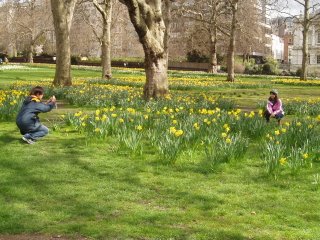
Oh, to be in England
When spring is here *
Journeying into work, the change to the Victoria Line at Green Park Station would become impossible on some mornings, due to some problem or other on the London Underground. This would necessitate my coming out onto the street and walking through Green Park, past Buckingham Palace and the hundreds of tourists who seem to get there at the crack of dawn. Green Park itself is a delightful place to walk through - provided the weather's condusive. With the British weather however, this is hardly ever the case, and an unplanned walk through Green Park grappling with the (never big enough) umbrella can be the worst early downer on one's day. Happily, the weather was nice - Spring! - on April 12 when I was forced out of Green Park station yet again for another unscheduled walk. The park was lovely and even at around 9.30am, tourists were already busy photographing themselves. So I got in on the act, and photographed them (above).
Fast forward to Friday 12 May and the weather was hot hot hot! I was walking through narrow Allington Street SW1 at 6.40pm. Wedged between an overfilled pub with drinkers spiling into the street and more people milling opposite outside the Victoria Palace Theatre's Stage Door, it suddenly became quite difficult to pass. The reason? A luxury car had stopped in the middle of the one-way road with such impunity I was beginning to think: ah, when this is not Lagos! 2 double-decker buses were now held at a standstill behind the unhurried car. Then out popped Elton John and his husband David Furnish - the most celebrated 'married' couple in London in recent months - from the back seat. I did not have my camera with me to record the moment. But it wouldn't have helped anyhow, because Elton and spouse disappeared into the theatre faster than you could say: Rocket Man.
My copy of the Evening Standard later informed that it was the one year anniversary of Billy Elliot, the stage adaptation of the film about a boy who wanted to be a ballet dancer - hence Elton John's reason for being at the Victoria Palace Theatre.
Getting onto the platform in Victoria Station, I had to let the first tube train that came along pass on by, even though I was in a hurry to get home. The reason was a big poster ad on the wall facing onto the platform. Had to let the first train go so I could get a good look. Designed like a jazz album sleeve with nostalgic Blue Note tones, it showed a young black man in a pose reminiscent of John Coltrane. The accompanying words astounded me:
16 Years of Age
Yemi Awopetu
Award Winning Saxophonist from St Aloysious RC College, A State School in Islington.
Yemi Awopetu! I was proud.
The poster was in celebration of London's high achieving students. Hopefully, it should remain in situ long enough for me to capture the image with my camera.
* Paraphrasing Browning: Oh, to be in England / Now that April's here - Home Thoughts From Abroad.
unchained melodies - akeh on okigbo
Excerpts
Akeh on Okigbo
"I still don’t think there is a poet, living or dead, with a keener sensitivity to tone and rhythm or the lineal representation of experience in its multiple associations and significations."
For the first time I was reading poetry without labour, with a pleasure uniquely its own. I had discovered poetry! I was like a blind man with eyes suddenly open, like a child offered the freedom of the land of sweets. I was greedy for light. I was greedy for life. I was bathed in this sudden sweetness of light and life. Now I knew: Poetry was not only to be consumed in solitude and then regurgitated with much rumination … Poetry was the very song of life. And in Okigbo, poetry was markedly African like me. It jigged to its very own unchained melodies. Poetry, I had now discovered, could have feelings, sometimes fart, and rage, and also pray. And it could be a dirge so uplifting it felt like a ballad. Or a hymn. No, poetry was not lawless. But it could also fly. You couldn’t clip its wings with rules. This engaging poetry I was being introduced to was an energetic art. In Okigbo it leapt out of the limitations of its pages - at you.
His lines came alive as you encountered them, filling you, making you, moving you, not letting you get away without feeling their tangible presence. You felt the love. You lived the rage. You saw the beauty. You did not merely read words. Those lines of his poems had character, emotion, attitude, intelligence. They possessed you as you read them.
Akeh on current African poetry
All poets love their art, don’t they? Well, not quite. You commit to nurturing what you love. You will hone it to brilliance. You would never think of poorly presenting or representing that thing you love in the public domain. But it is the case, these days, because of the ease of publication, multiplicity of media and the greater exposure of everything and everyone to everything and everyone else, that a greater temptation now exists for would-be poets to focus not on the perfection of their craft but on its placement, on playing the system. There are opportunity providers outside Africa, who are sometimes inundated with unsatisfactory material from young African writers and left with no option but to help and allow passage to whatever is seeking passage or approval. But marking up Africans or African initiatives because the material is out of Africa is just as bad as marking down Africans for the same reason.
Read I Return to Okigbo in full here.
And who is Christopher Okigbo? There is no gainsaying the fact that Christopher Ifeanyichukwu Ifekandu Okigbo was unquestionably and by far, the greatest poet to emerge from the African continent of the twentieth century and indeed, in the words of Heinemann (Okigbo’s London publishers), one of the most remarkable poets of the present day. Okigbo’s claim to greatness as a poet rests on five main factors according to the conference conveners, namely: “his all-inclusive multicultural sensibility; his mythopoeic imagination; his infusion of ritual seriousness into praxis of poetry; his masterly fusion of a wide diversity of poetic modes from traditions across the world; and above all, his all-encompassing vision of reality.”
Read the article here.
When I first discovered Okigbo's poetry, my 1982 edition of West African Verse referred to him in the present tense. To learn years later that he had died in the war! And how I longed to breach the impenetrable mists of time to touch Christopher Okigbo… And then, for half a page or so, he comes alive in The Man Died, lovingly preserved by his friend Soyinka.
"Christopher rushing in his whirlwind manner into the office in Enugu… Hot and breathless he delivers the instructions… from the front." And seeing his friend, "Christopher's eyes pop out of his head, then he breaks into that singular Cherokee yell-and-jig which has raised squirms of unease among a host of self-conscious acquaintances in every corner of the globe." He had sat for hours with Soyinka as the latter awaited trial in a police cell in 1965, "discussing poetry…"
At their last parting, Okigbo said: "You know I'm not a violent man. I'm not like you. But this thing, I am going to stay with it till the end." And off he went for his rendezvous with death… It is a joyous celebration of Okigbo's life, yet painful to read. My only consolation lies in words by Wilfred Owen, another poet who perished in war: "The poetry is in the pity."
Saturday, May 13, 2006
pele: how the no.10 shirt passed into legend
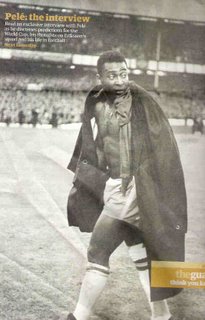
One doesn't bother much with sport on this blog, but heck, it's World Cup year! And one must concede that football at its very best is an art. And they don't come greater than Edson Arentes do Nascimento - that's Pele to you and me. It was thanks to Pele that I didn't throw away the 'Sport' pullout of the UK Guardian today. In a sumptuous two page spread, we learn about how a 17-year-old boy walked onto the football pitch in 1958 and passed into history, making the no.10 football jersey the stuff of legend.
Excerpts
About me [the team psychologist] concluded that I should not be selected: "Pele is obviously infantile. He lacks the necessary fighting spirit." ... Fortunately for me... [the coach] was always guided by his instincts and he just nodded gravely at the psychologist, saying: "You may be right. The thing is, you don't know anything about football.
When on June 15 I ran out into Gothenburg's Nya Ullevi stadium, there must have been a fair few of the 50,000 spectators who were taken aback to see a little black kid with the teams. And they must have been astonished when I stripped off my tracksuit to reveal a Brazil shirt with a big number 10 on the back. I imagine there were some who assumed I was a kind of mascot, especially when compared with the Russians, who were all huge. I remember looking at them and thinking, "They're big . . . but big trees can be felled too."
Read the rest, straight from the horse's mouth. The Guardian promises more Pele exclusives over the coming week.
soyinka's book
 Here is the Nigerian edition of Soyinka's new book of memoirs, You Must Set Forth At Dawn.
Here is the Nigerian edition of Soyinka's new book of memoirs, You Must Set Forth At Dawn.Published by Bookcraft, the book had its presentation yesterday in The Atrium of the Silverbird Galleria, Ahmadu Bello Way, Victoria Island, Lagos.
Read Ikhide Ikheloa's review of the book here.
toni kan interview
 "I’m not going to write utopian literature, because I don’t write science fiction. I write fiction that reflects the reality of my own existence. I can’t write escapist literature. I think it’s left for the writer to listen to the inner voice to give him a story..." - Toni Kan
"I’m not going to write utopian literature, because I don’t write science fiction. I write fiction that reflects the reality of my own existence. I can’t write escapist literature. I think it’s left for the writer to listen to the inner voice to give him a story..." - Toni KanRead Toni Kan 's latest interview here.
Photo: taken at Sentinel Poetry Live! 1, 1st April 2006
sefi atta interview... & adichie
We lived off Queen’s Drive minutes away from Five Cowry Creek. We had dogs, geese and chickens running around our backyard and a vegetable patch that used to flood during the raining season. It was one adventure after the other and indoors we had a library of Jane Austen, Huck Finn and other books. I took the usual piano, ballet and tennis lessons that my friends were taking and did not excel in any. I couldn’t be bothered to practice. My father was a Moslem and my mother is a Christian, so on Fridays I had Quoranic lessons with a Syrian family that lived down the road, and on Sundays I went to church. I attended Corona School in Ikoyi and after school played with kids in my neighborhood and of course we fought too. We had gangs and went from house to house by bicycle. It was a regular childhood until my father died when I was eight. That was a difficult time. He was the head of the Civil Service and I found out that he had died from a newspaper headline. My family moved to another neighborhood by the Lagos Lagoon. The place was full of expats. Our neighbors were French and Austrian and their children didn’t speak English. We loved our new house though. Our garden led right into the lagoon and my mother had a speedboat. She would take us to a remote beach called Olomo Meta. It was great. She also began to travel overseas with us. You can imagine a Yoruba woman with five children in tow showing up at a bullfight in Seville or wherever. People just used to stare at us. My mother gave me that sense of being a citizen of the world. Roots and wings. She was very proud of Yoruba culture and embraced all cultures.
- Read the interview here.
... and Chimamanda Ngozi Adichie says:
"Many of the stories we tell have already been told. It is the freshness we bring to the re-telling that matters."
Read the rest here.
helen oyeyemi @ african writers' evening - may 19
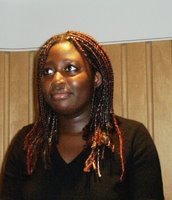 African Writers' Evening on May 19 at the Poetry Cafe will feature Helen Oyeyemi (author of The Icarus Girl).
African Writers' Evening on May 19 at the Poetry Cafe will feature Helen Oyeyemi (author of The Icarus Girl).Also on the bill are young poets - Clara Bakosi (Nigeria) & Louis Antwi (Ghana), who have emerged from the annual Lynk Reach schools Slam project coordinated by Jacob Sam-La Rose..
The line up in the following months include: Hisham Matar (selected Borders Best books of 2006 - Libya); Wangui Wa Goro (writer, translator of Veronique Tadjo and Ngugi wa Thiong'o - Kenya); and Brian Chikwava (2004 Caine Prize Winner - Zimbabwe).
The Poetry Cafe, 22 Betterton Street, Covent Garden, London WC2 / Date: Friday 19th May / Time: 7.30pm.
Photo: taken at The British Library, 15th October 2005.
meet achebe, uche okeke, udechukwu & stephen vincent
By a beautiful coincidence three events, involvingfour old Nsukka friend of the 1960’s and 1970’s, will be taking within three days in New York and Newark
May 31, 2006 Stephen Vincent will be reading his poetry with Susan M. Schultz and Mark Wallace, on Wednesday, May 31, 8 pm, at the St. Marks Poetry Project, 131 East 10th Street (at 2nd Ave), Manhattan,New York.
June 1, 2006 Obiora Udechukwu will be opening his solo exhibition at the Skoto Gallery, 529 West 20th Street, 5th Floor, on on Thursday, June 1, with an opening reception from 5:00 to 8:00 pm - Guest of Honor is Chinua Achebe; Phone: 212-352-8058.
June 2, 2006 Uche Okeke and Chinua Achebe: Artist and Author in Conversation, Friday, June 2nd, 2006, 6:30pm, The Newark Museum. The organizers say: Join us for an extraordinary evening as The Newark Museum presents a moderated dialogue with two of Nigeria's cultural luminaries. Uche Okeke, one of Africa's foremost modern artists, and Chinua Achebe, widely regarded as a founder of modern African literature, will discuss their work and the role of artistic expression in the context of Nigerian independence.
Chukwuma Azuonye, PhD
Professor of African Literature
University of Massachusetts, Boston
Sunday, May 07, 2006
akin adesokan on writing

Akin Adesokan
In a new interview, Akin Adesokan, author of Roots in the Sky, discusses writing, touching on the difference between journalism and fiction.
“In journalism, you are writing on specific events. Things that happened. Like when Tai Solarin died, and I went to cover the burial. That was an event that happened. I followed an event and wrote on it. Then when I got home in the night, I went and sat behind my desk and started writing my fiction. So there was a transition. So when you write fiction, you are following ideas. You are creating things. In journalism, you have materials in front of you. Writing is basically an attempt to wrestle with language. And there are writers who have employed the method of journalism to write fiction... In journalism, the reporter works under a deadline. For me, that has been very helpful. I can set a deadline for myself and finish up under that deadline. Even when I was doing my PH.D, I was able to write under a deadline. There was a time when we used to say that journalism would weaken our prose. But with my experience, the discipline has been very helpful.”
Read the interview here.

Roots in the Sky
Excerpt from Roots in the Sky...
Society and the economy, he declared, had destroyed the basis of community, ‘Emi ni won n wi?' wondered an old woman confused by too much grammar. That explained his tourist attitude to the village which, he now admitted, he still visited because he had always believed he could provoke some organisation. If the village had been a truly communal one, if commerce and square meals had not been the new gods of the populace, he remarked, perhaps there could have been some mutual interest, something lasting enough to make for a worthy protest. Had the landlord not been preoccupied with politics, he wouldn't have continued to let the village be. In our land, politics would continue to determine everything, forever. (But most of the people I knew in the village, from the medicine-man down to even myself, with the single exception of Kilanko, were apolitical. What would Lagos and politics mean to us, save the prayer that the bulldozers never came?) Kilanko revealed much of what happened the previous night and what little the priest or anyone could have done to avoid the embarrassment. But many people, including the old woman who had earlier wondered, hissed time and again throughout Kilanko's tirade. One, a short cantankerous woman said, ‘No use crying when, the ‘ead is already hoff '. Another, a man, derided ‘big, big grammar without solution', and it was his opinion, which he boasted was shared by many of his friends, that when people began speaking ‘big grammar' they were either frustrated or looking for ways of ‘chopping money'. One man who housed the medicine-man for the night wept as he narrated the deceased man's ordeal as he tried to sleep. The body had been taken out of the village just before the bulldozers arrived. One of the members of the church seized a moment of silence to recall in great detail the event of the previous night in the church, the priest's insistence on revival and all that happened before ‘some men of dishonour' came. He didn't care that the men were present. That man was still talking, some children crying, others playing innocently, women gossiping women brooding and yet others packing and unpacking their belongings and the clearing had been turned into another impromptu village. A woman shouted and spanked her son who had just spilled their rice among the entangled weeds of the clearing. Another blamed herself for having forgotten a bucket she purchased two days before, finally resting the blame with the husband who was hurrying her without lending a hand. The churchster was still talking when the smell of burning overwhelmed the domestic smells and announced a fresh disaster.
*Author's photograph by Sola Osofisan
sentinel poetry live! 2

The 2nd Sentinel Poetry Live! readings took place in London last night. The readings will hold on the first Saturday of every month. On the programme were: Lola Shoneyin, John John-Lewis, Chinwe Azubuike & Naomi Woddis.
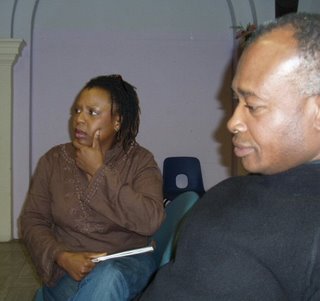
Lola Shoneyin (author of 2 collections of poetry, from which she read at the event), seen here with poet Afam Akeh.
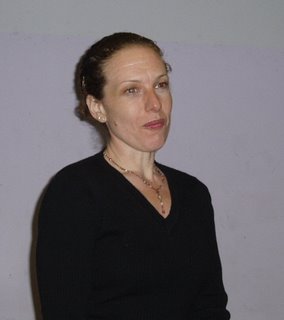
Naomi Woddis read poems including All That is Lost is Not Lost.
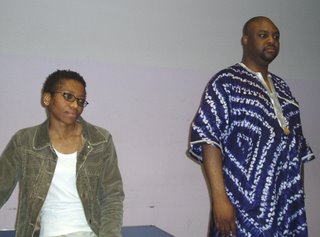
Chinwe Azubuike (left) whose poems sparked quite a bit of debate, seen here with event host Nnorom Azuonye.
sonponna
 My photograph of the sculpture of Sonponna, the Yoruba deity of Smallpox - a kind of avenging god - is published in the current edition of the Sentinel Poetry Online magazine.
My photograph of the sculpture of Sonponna, the Yoruba deity of Smallpox - a kind of avenging god - is published in the current edition of the Sentinel Poetry Online magazine.This and many other sculptures in the grove were made by Suzanne Wenger a.k.a Adunni Olorisa (born in Austria, she has lived in Osogbo for over 50 years) and other artists in the town.
The picture was taken in the Osun grove in May 2003.
africa reading group meetings
Meetings in May
Fiction: Doris Lessing's The Grass is Singing - Thursday 18th May @ 6.30pm
Non Fiction Group meets on Wednesday 24th May @ 6.30pm and will be discussing these works
- The Wretched of the Earth by Frantz Fanon
- Summer in Algiers by Albert Camus (a short story, published by Penguin as part of their Penguin 70 series. It costs £1.50)
- Battle of Algiers A film by Gillo Pontecorvo, (1966)
- June: Fiction - Purple Violet of Oshaantu by Neshani Andreas (2001, Namibia)
- July: Fiction - Land Without Shadows by Adbourahman A Waberi (Djibouti, 2005) / Non Fiction - The Ukimwi Road: From Kenya to Zimbabwe by Dervla Murphy (1994)
- August: Fiction - Secrets by Nuruddin Farah (Somalia, 1998)
- September: Fiction - Madonna of Excelsior by Zakes Mda / Non-Fiction - Change of Tongue by Antjie Krog
oguntokun's prison chronicles
 Four inmates... the story of a country.
Four inmates... the story of a country.... Humorous and enlightening - The Guardian
Wole Oguntokun's Prison Chronicles returns to the Agip Recital Hall, Muson Centre, Lagos.
Sunday May 14, 2006 @ 3 & 6pm
Tickets: N2000 (students: N1000)
Info & Bookings: Tel - 0802 301 3778 / 01-897 1691 / 01-813 6229
ana abuja - may events
Saturday, May 06, 2006
keziah jones @ the jazzhole today
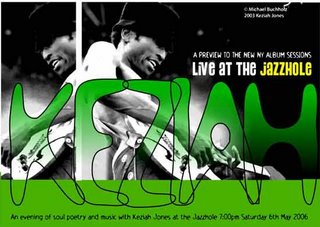
Keziah Jones drops into Lagos this week and will play tracks off his new album at the Jazzhole - today, Saturday 6th May. 'Keziah Jones (aka Olufemi Sanyaolu) kicks off the show at 7pm.
Venue
The Jazzhole
168 Awolowo Road
Ikoyi, Lagos
Date & Time: Saturday May 6th 2006, 7:00pm
Further info: Tel - 8953498 /08028988372
